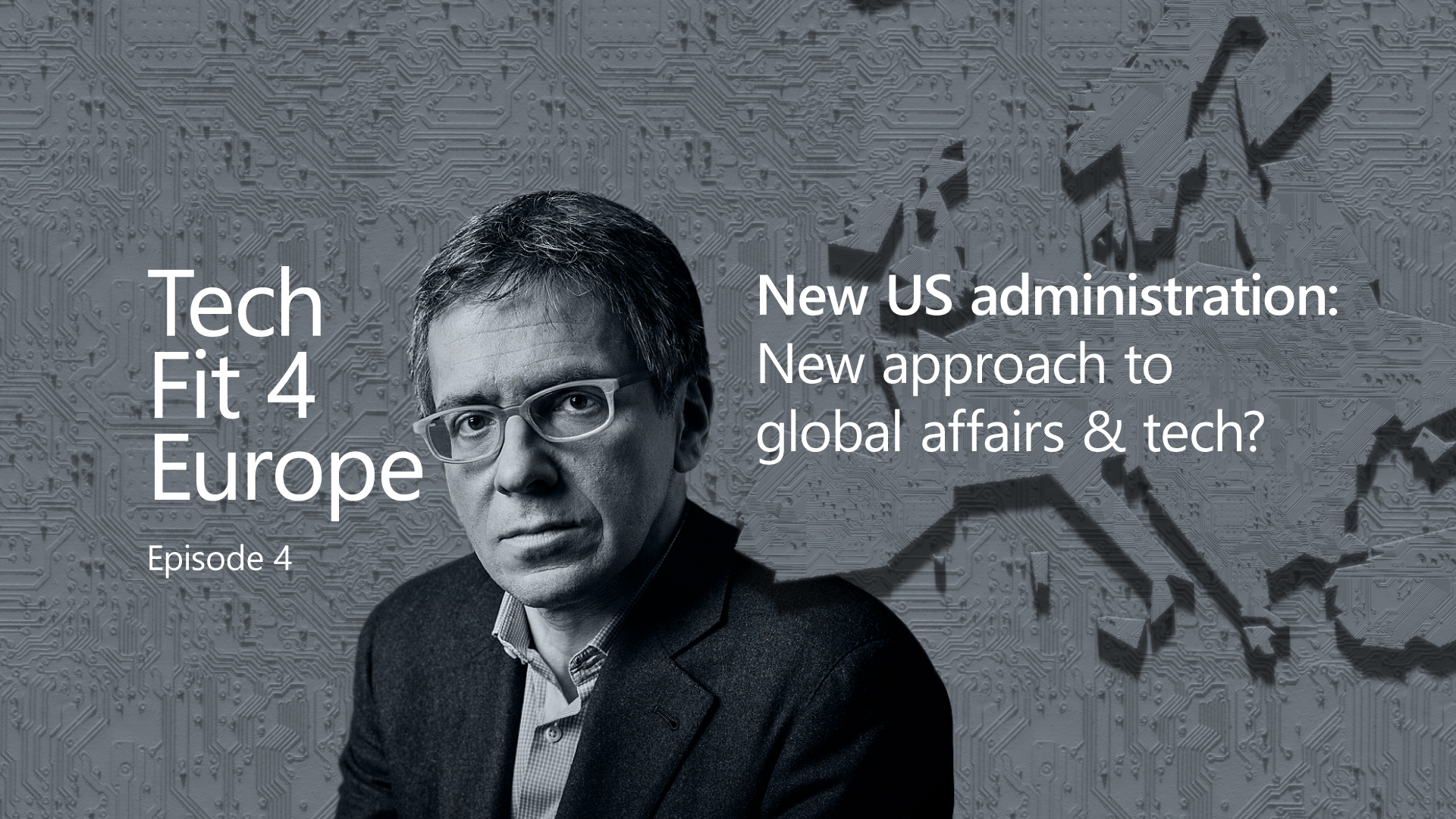The coronavirus pandemic has exacerbated existing inequalities, reshaped the world and fundamentally changed our relationship with technology. So says Ian Bremmer, a renowned political scientist and the founder of political risk research and consulting firm Eurasia Group.
On 6 November 2020, he joined Casper Klynge on our #TechFit4Europe podcast to talk about the geopolitics of technology, and how the competing visions from China and America are affecting Europe’s role on the global stage.
Here are five takeaways from their conversation:
1. A ‘more multilateralist’ White House
Bremmer believes that President-Elect Biden will be “much more multilateralist in orientation” and that there will be a return to past policy priorities.
“He’ll bring the U.S. back into the Paris climate deal,” Bremmer says. “And he’ll bring the U.S. back into the Intermediate-Range Nuclear Forces Treaty. He’ll try to get the U.S. back into some reworked version of the Iranian nuclear deal, the JCPOA, which of course the Europeans strongly support.”
But Bremmer also reminds us that things are not necessarily clear-cut on Capitol Hill. “The Senate is likely – not definitely, but likely – to remain in the hands of the Republicans,” he says. “Now, what that means is that you will have an election that Biden will have won… and yet he will have no capacity to advance political reforms.”
2. A more polarized world
We’re not witnessing the end of globalization. But things are changing, Bremmer believes, and the world is becoming more polarized.
“There are all sorts of interdependencies around the world,” he says. “Including, most notably, between the U.S. and China, that are not about to go away.”
China has so far avoided a pandemic-induced recession, but there is less certainty over its future position than America’s because of distrust around its use of technology, Bremmer argues.
“China’s power on the global stage… has accumulated in an extraordinary, world-changing fashion,” he says. That’s partly due to its large population, gifting the country a large number of smart and hard-working employees.
But what was once a global competitive advantage is now increasingly less relevant, he continues: “Because of big data, because of automation and machine learning.”
Bremmer also expects there will be more competition between Washington and Beijing as technology becomes a fundamental part of national security. But he doesn’t foresee catastrophic fallings out, however, as the two are also dependent upon one another.
3. A shift in the transatlantic relationship
After a period of divergence between the EU and U.S., there is the prospect of greater alignment on the horizon in some areas.
There is hope that the new Biden administration will bring fresh thinking to foreign policy and key areas like climate change, even if the pace of change is slower than some would like.
Biden also understands that a strong EU is good for the U.S.
And while issues like Brexit have created challenges both within the EU and with EU-U.S. relationships, the pandemic has brought some cohesion.
“It’s a very good sign that in the middle of coronavirus that the Europeans have been able to come together and recognize that Europe is in the same boat in fighting this and economically they need to prop up and support their poorest and their most challenged members,” Bremmer says. “[This is] very different from how the Europeans responded to the eurozone crisis.”
4. The threat of dehumanization
One of the risks posed by the pandemic is the possibility of people becoming dehumanized. This, Bremmer says, is a consequence of so many everyday interactions migrating to the online world.
“Now, what I know about human history, and what concerns me perhaps the most in some ways, is that we tend to treat very badly those people we have very little connection to personally,” he warns.
For Bremmer, this is a real cause for concern as interpersonal connections are being weakened. “If suddenly we have an entire generation of young people who spend most of their lives being intermediated by a series of applications… I do believe that we are much more likely to dehumanize the other, to no longer think of them as people.”
5. The techlash isn’t going away just yet
The U.S. technology sector is being looked at critically by some in Europe, Bremmer feels – particularly in light of the economic downturn provoked by COVID-19.
There are differences in regulation on either side of the Atlantic, in Bremmer’s view, which also further fuel a sense of division. Europe will want to continue to play a role in determining how technology, and data in particular, must be governed, though.
“Americans let corporates self-regulate to a much greater degree at the expense of privacy, and I don’t see that changing with the Republican Senate in the U.S. and with a six-three conservative Supreme Court in the U.S.”
Available on Spotify | Apple Podcasts | Google Podcasts | RadioPublic | Libsyn | RSS
A transcript of this episode will be available shortly.

